Picturesque lavender fields, charming villages, French bread, lines of olive trees, the scent of orange blossom and jasmine, and the sound of cicadas chirping during the summer months, Provence really is plucked from a movie set.
Indeed, this region in the South of France has been an inspiration for many Francophiles wanting to pack their bags and run away to France.
But can the dream become a reality? Is Provence really a good place to live? Or should you stick to dreaming about it? We've taken a deep dive into one of France's most popular and iconic regions.
Secure Peace of Mind with Best-Value International Health Coverage
International Citizens Insurance provide free, no-obligation quotes from the leading international health insurance providers with plans tailored to meet your needs. Trusted by thousands of expats worldwide.
Living in Provence - an overview
In the South of France, quality of life takes precedence over pretty much anything. Life here is easy, gentle, and slow.
Provence is surprisingly large: it stretches from Nice, Marseilles, and Cannes on the coast to Grenoble in the North.
With France's second-largest city, Marseille, as the area's capital and the powerhouses of Nice and Cannes along the coast, city life in Provence is some of the best.
However, most people tend to gravitate to the area's small villages, which are famous for their cobbled streets, local charm, and simple, rustic way of life.
You'll find good connections, good schools, good medical and public facilities. Everything in Provence is reasonably easy to find, and if you're willing to drive, everything you could ever need is less than an hour away.
The cost of living in Provence
Living in Provence is a dream, and as most of us are aware, dreams usually come with a nightmare price tag.
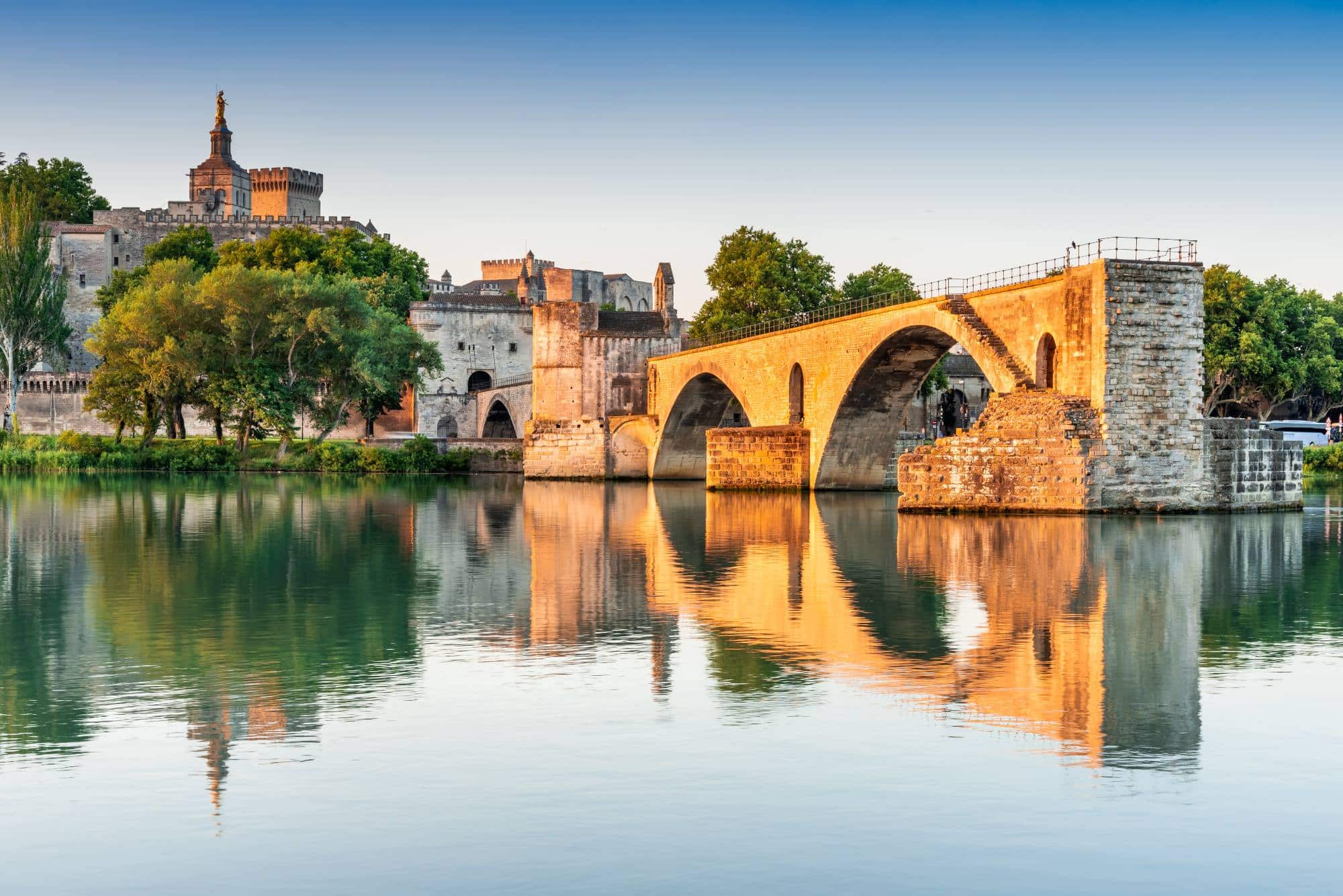
The good news is that it isn't necessarily true for life in Provence. Sure, if you live in the French Riviera, you can undoubtedly end up spending a fortune. But the rest of the area is reasonably priced.
Food and groceries
Because of the fertile ground and good weather, lots of food here is local, and basically everywhere will have a weekly market, which means food costs here are relatively low.
Fruit and veg will generally cost you less than a euro for a decent amount of anything.
Meat and fish are best bought from a butcher or fishmonger. Particularly along the coast, fish from local fishermen is very cheap and available in abundance.
Although Provence has some very remote rural areas, there are plenty of large towns that sell everything from fridges to trainers to iPhones and more. Here, prices are as good as you'd get anywhere and are pretty standard across the area.
Fuel varies hugely, and two stations close together can have wildly different prices.
Don't forget to factor in your healthcare costs: expats in France need health insurance to establish a legal residency.
Eating and drinking out
When it comes to restaurants, a local village restaurant will offer excellent freshly cooked food for a decent price.
Local food and local wines mean a couple can eat a fantastic dinner for 50€. Fancier restaurants can be €50 per person.
In the large towns of Marseille, Nice, Toulon, and Cannes, you'll obviously find restaurants for all budgets. There's everything from McDonald's to Michelin stars.
If you want to go to a bar, even the tiniest villages will have a local one. And the wine will be as cheap as the water. Local roses are very popular.
Beer is also fairly cheap unless it's a swanky downtown bar in Nice. Of course, some exclusive bars on the seafront have champagne for €300. But generally, affordable drinks are not hard to find.
Property in Provence
Depending on the area, buying a property in France can be a really good investment. When it comes to property on the south coast, however, it's all about the postcode. You are, after all, going to live in the French Riviera.
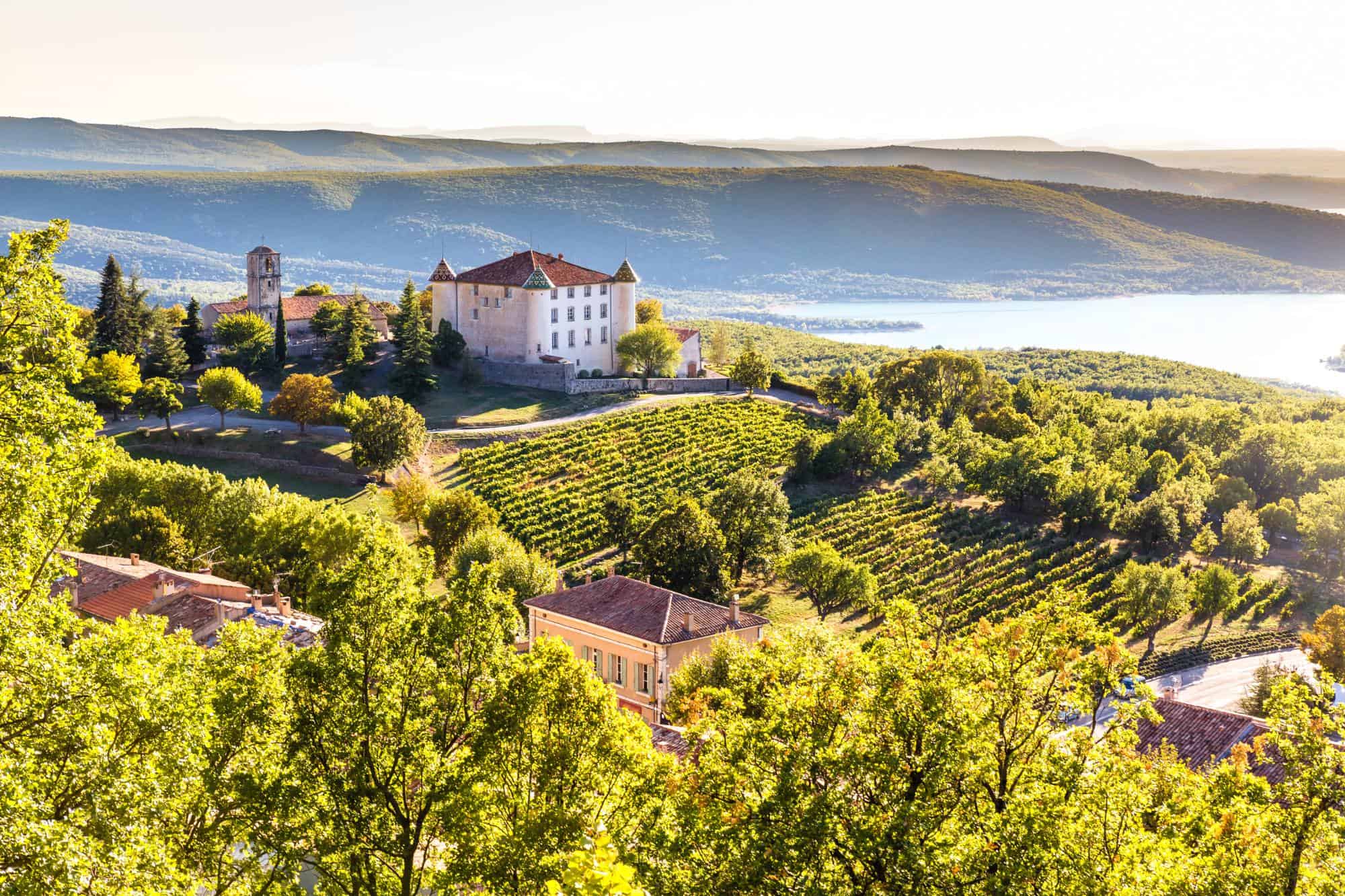
House prices in Monaco, Monte-Carlo, and Nice are sky-high. House prices generally start at €800,000, and they only go up.
As a new arrival, you would probably want to rent a property in France first.
For a one-bed apartment in the center of Nice, expect to pay around €1000 monthly rent.
To buy a one-bed apartment, you're looking at a minimum of €250,000. It's not unusual to find properties over a million, and even these will be snapped up.
Away from the coastal cities, house prices are only slightly more reasonable.
An old French farmhouse, called a Mas, will be around €1 million. If you're looking for a decent modern house with a garden, €350,000 is a good starting price.
Old stone houses are hugely in demand and will be more expensive, starting at half a million.
A house in a village with a terrace but no garden will be reasonably priced from €250,000.
Honestly, if you plan to move to Provence, the cost of your property is your biggest worry. They aren't cheap, and they don't stay on the market for long, so you have to pounce. Luckily, once you've got somewhere to live, everything else is pretty affordable.
The pros and cons of living in Provence
It's a lot to take in, and there is so much variety that working out what you want can be overwhelming. To help make it as simple as possible. Here's a quick breakdown of the most basic pros and cons of living in Provence.
The pros of living in Provence
1. Huge expat community
Provence is popular, and if you move, you'll have plenty of support and advice options. Lots of people have already taken the plunge.
2. High quality of life
It's a slightly slower pace of life involving long coffee and wine dates, but it's a good life.
3. Good economy
Provence is an affluent area with so many tourists and several major thriving cities, which means good investment.
4. Consistent weather
Even in winter, the sun usually shines here. It is colder in winter, but it’s more manageable. Some locations in France boast mild weather all year round; such type of climate is very beneficial for your health and longevity.
5. Stunning scenery
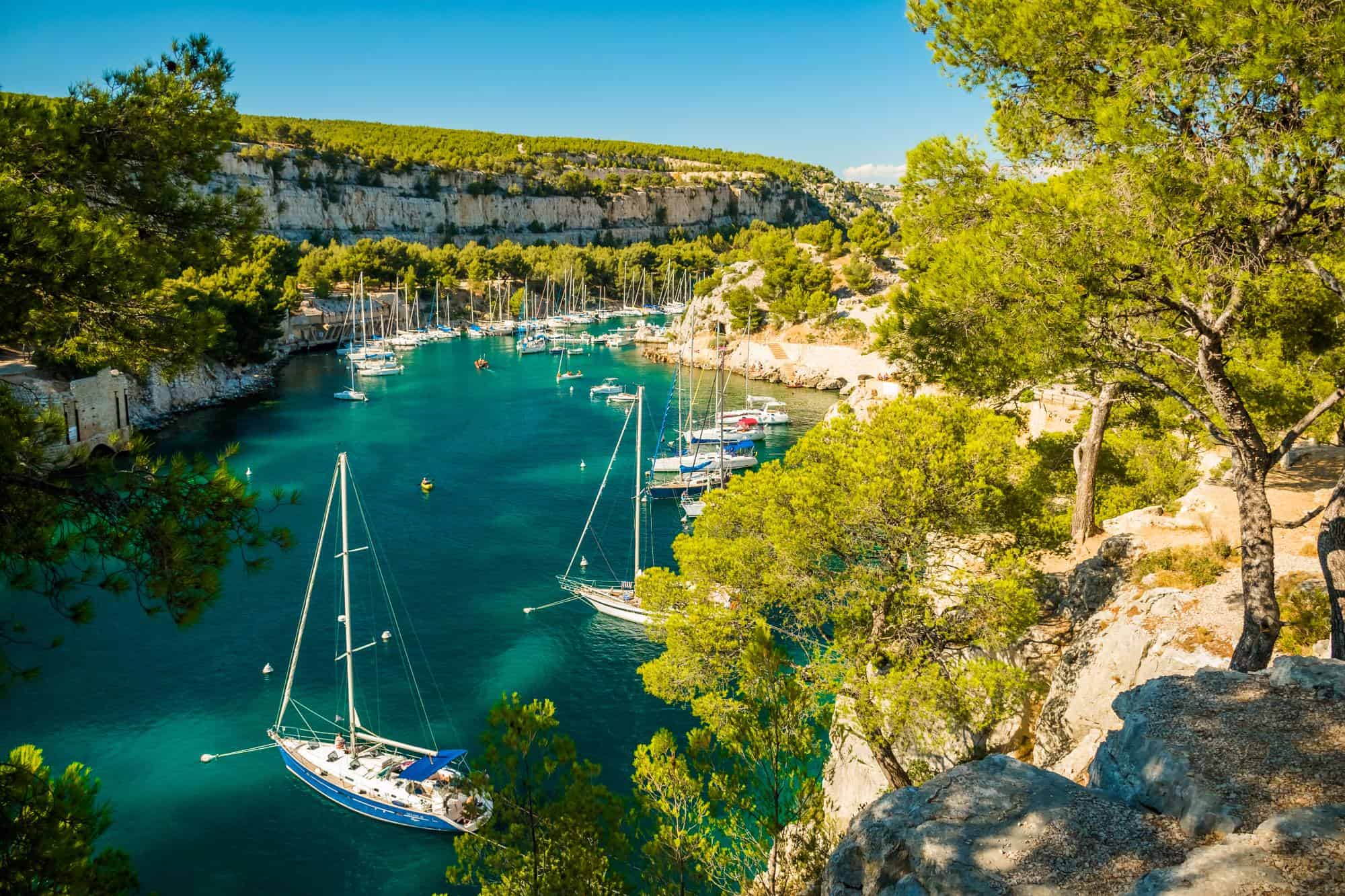
There's no denying that Provence is a beautiful place to live. Rolling hills, sea views, olive groves, vineyards, mountains, and beaches; it's got it all.
6. Great connections
With airports and seaports, getting yourself and your stuff in and out is easy. Importing goods is fast and cheap, and flight options are plentiful.
7. Easy to find work
From local, part-time jobs to major corporations to online freelancing, it's easy to find work in Provence.
The cons of living in Provence
1. Inconsistent internet
You might have a good signal. You might not. If you don't, there isn't much you can do about it.
2. No rush to get things done
Plus, everything shuts at lunch. Everything. For at least two hours.
3. Tourists
Even if you don't live in a major town, the beautiful villages are a big tourist attraction, so summer can be hectic. The prettier the village, the more tourists.
4. Public transport? Forget it...
Public transport is inconsistent. Honestly, you need a car.
5. House prices
You can find cheaper areas, but in reality, most places are relatively expensive. You get what you pay for, and you will be paying if you want luxury.
6. Language barrier
In the summer, the locals generally speak English because they rely on tourists. However, outside of the summer months, you'll be hard-pressed to find a French person willing to talk in English. They can, but they won't. You need to learn French.
7. Lots of foreign neighbors
If you want to be the only foreigner surrounded by locals, Provence is not for you.
Best places to live in Provence, France
If you think life in Provence would suit you but have no idea where you might want to live, we've taken a look at some of the best places to be. Provence is super varied, so whether you're a city slicker or a country bumpkin, you'll find a place that works for you.
1. Toulon
If you want the glamour of Nice and Saint Tropez but don't want the price tag, Toulon is ideal.
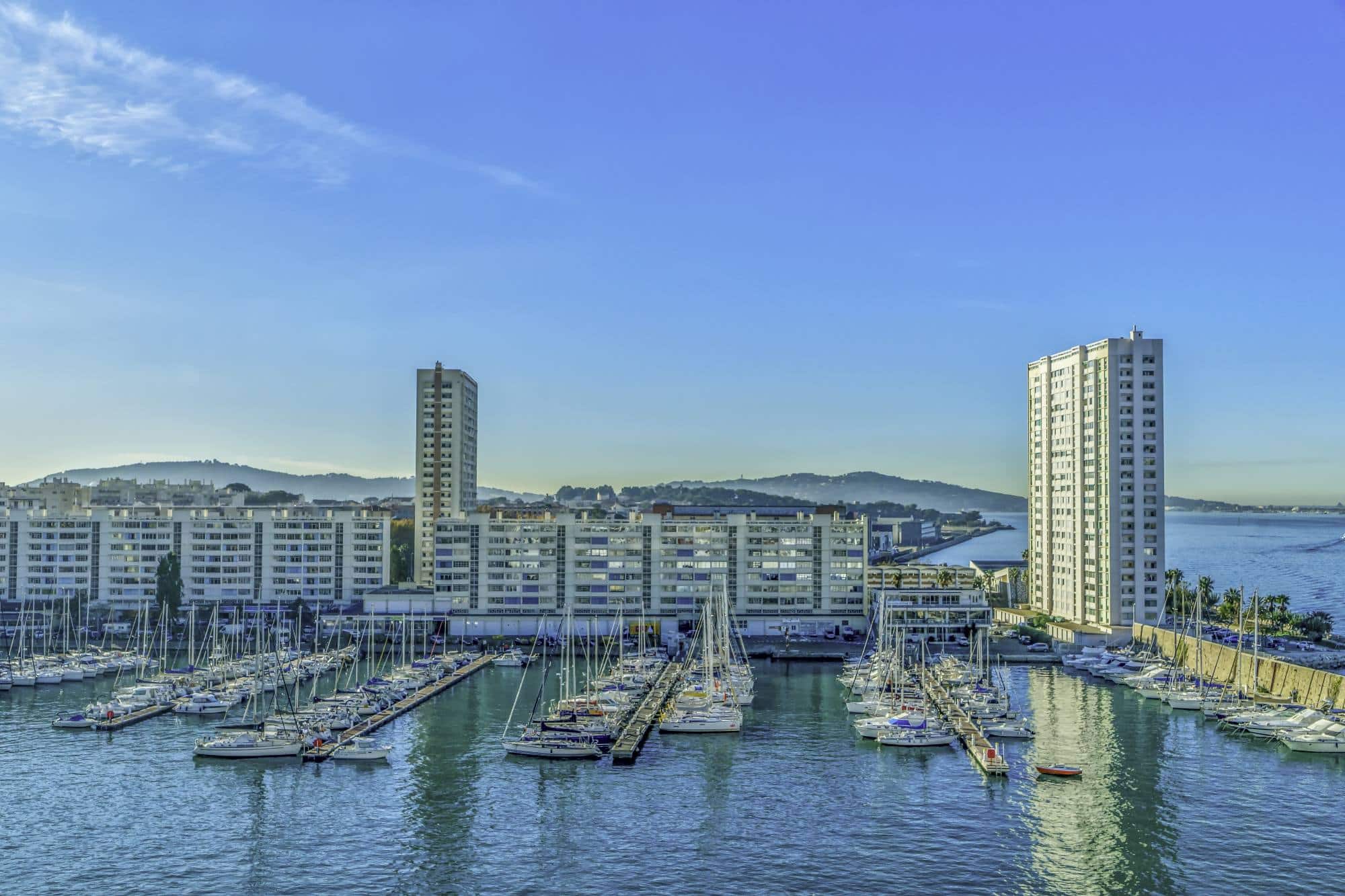
The coastal city sits further toward Marseille, meaning it has better connections. It's got wide boulevards lined with palm trees, beach bars, and shops, and the harbor means there is a real town center.
It is also a bit more practical for day-to-day life than its more famous neighbors, meaning you'll actually be able to find a handyman to fix your toilet in winter.
You are not far from good beaches either. It's easy to take a bus to one of the suburbs, Six Fours Les Plages or Saint Mandrier, both of which have lovely coastlines and small beaches.
The nearest beaches to the center of Toulon are located a mile south of the city center, at Le Mourillon, and you can also reach it by bus.
2. Avignon
If the sea doesn't really do it for you, but you still want all the pros of city life, Avignon would be perfect.
It's a major city, meaning you can find everything you need here. Of course, not being on the coast means no breeze, and the summer heat can be intense.
Avignon was home to the Pope, so it has a stunning city center, and the winding old streets have the feel of an old village—the best of both worlds.
3. Uzès
Uzès offers village life with a touch of modernization. It has leafy, cobbled streets full of independent boutiques. It has the market and the antique market. It has beautiful gardens, and a river for swimming.
It also has schools, doctor offices, and the practical needs of everyday life. Uzès offers traditional French Mediterranean life with a bit more of a buzz.
4. Saignon
If you really want to experience proper rustic, rural French life, you could do worse than Saignon.
This tiny village is one of the most picturesque in France. It's super well maintained, so if you do buy here, you better be prepared to keep your home in top condition.
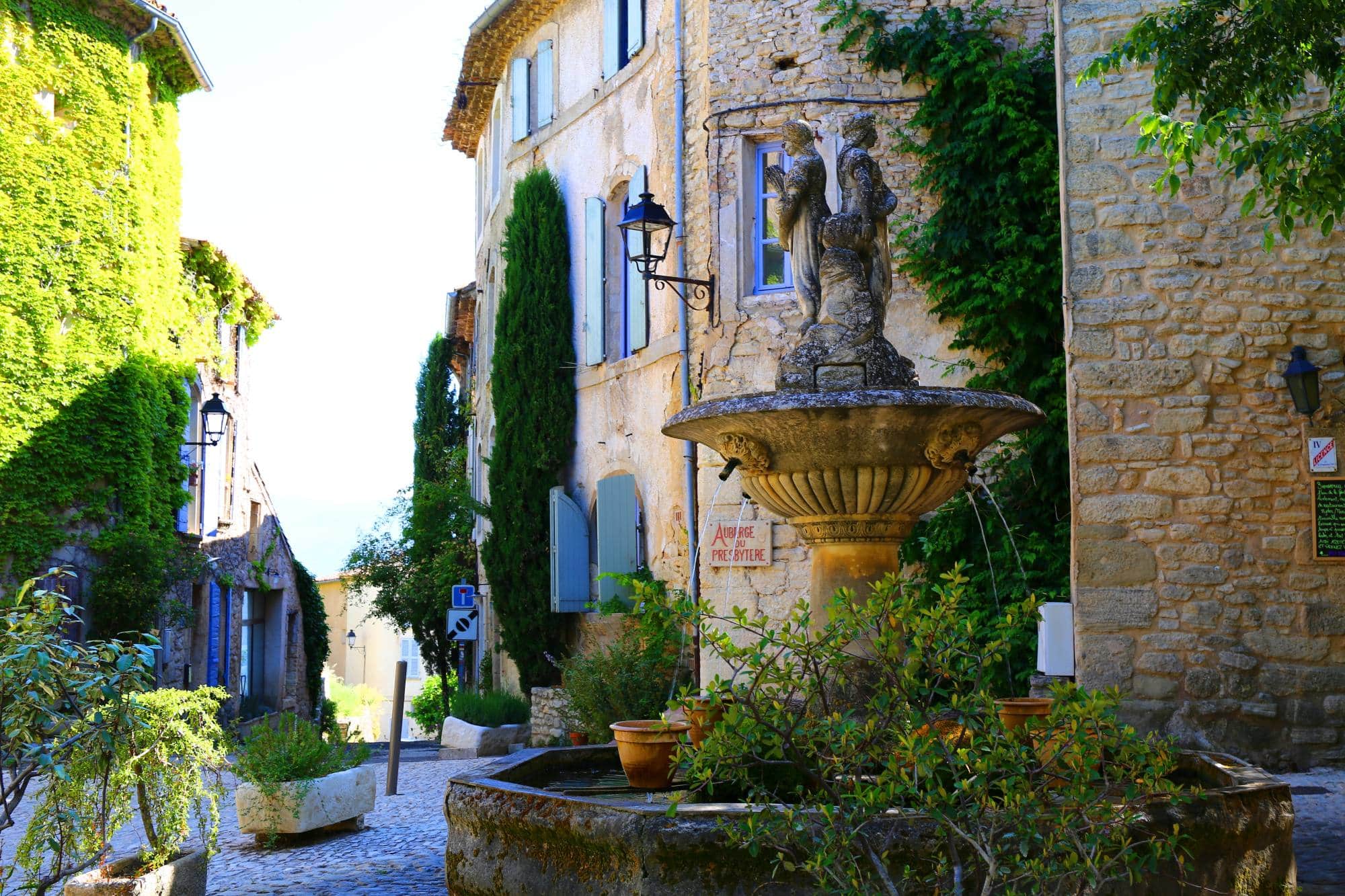
Walking around the village is like something from a Disney film. The views are incredible, and honestly, it's hard to be stressed here.
The village is large enough to have its own bakery, café, a few restaurants, a post office, and a shop, but you'll need to head further afield for anything else.
Expats in Provence, France
The expat community in Provence is enormous. Plenty of people have already moved to the area, resulting in a thriving and very active expat community.
In fact, there are so many foreigners in the area that a quick search on Facebook will reveal multiple expat groups full of pages and pages of advice.
Facebook communities are a great way to get in touch with other expats. Depending on the area you are in, you might want to join more than one group. For example, there's a group for Provence, a group for Nice, a group for Marseille… You get the picture. Join several.
In the big cities, you'll find it easy to meet other expats. There are English film nights and English-speaking book clubs. They might be organized locally rather than by an expat group, but you can be sure to meet other expats at these events.
If you want to meet new people but need a bit of liquid courage, the Aix Wine Club for expat wine lovers is perfect. Head to meetup.com to find all the different clubs and groups in the area.
Unlike other parts of France, where the expat community is purely about meeting up and sharing advice, the expat community in Provence is very active and offers practical support.
Expats will be able to recommend English-speaking builders and handymen. They will be able to help you navigate the world of French paperwork, help you find a property or a job, and even help you learn the peculiarities of the French people.
Living in the Southwest is like automatically joining a club, so even if you are reluctant to participate in expat activities, be prepared to be invited.
Living in Provence - summary
Life in Provence is set against one of the most beautiful backdrops in the world. From the coast to the mountains, the area is undeniably stunning. Combined with the Mediterranean weather, it's no wonder so many people want to live in this area.
The result is a reasonably expensive property market. However, once you're settled, the cost of living is relatively affordable, and you can live a good life on a small budget.
The airports and port cities mean everything you could ever need is within reach or easily imported.
The major cities like Saint Tropez can be touristy in summer, as can the charming traditional villages. But frankly, it's worth putting up with the tourists to live here year-round. You'll find a thriving expat community and plenty of support.
If you've ever dreamed about packing a suitcase and moving to Provence to live your best life in the South of France, we're here to tell you that not only is your dream possible and manageable, but it’s also an excellent idea.
Other popular expat destinations in France to consider:
- What’s It Like Living In Brittany As An Expat
- What Is It Like Living In Burgundy, France
- Living In Provence
- Living On The French Riviera
- Living In The Dordogne As An Expat
- Living in Saône-et-Loire, France
- Living In Normandy
- Living In Auvergne-Rhône-Alpes
You might find useful:
- Living In France Guide – everything you need to know to plan your move and settle down in France
- The Best Places to Live in France – a detailed overview of France’s most popular locations for expats.
- Opening A Bank Account In France As An Expat
- Healthcare In France For Expats
- Understanding International Health Insurance: A Comprehensive Guide
- Didn’t find what you were looking for or need further advice? Comment with your question below, and we will do our best to help.
Secure Peace of Mind with Best-Value International Health Coverage
International Citizens Insurance provide free, no-obligation quotes from the leading international health insurance providers with plans tailored to meet your needs. Trusted by thousands of expats worldwide.




